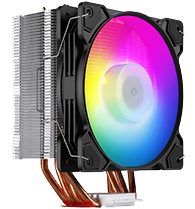Over the years, BINGFENG groups have invested in technology and people. This has helped us become one of the trusted and popular CPU COOLER manufacturers.We provide customized solutions for CPU COOLER that enable us to stay true to our commitment of serving customers according to their requirements.Click on the model below for specifications, and contact us.

| Series | mm | inch | Inquire |
A CPU cooler is a critical component in a computer system responsible for dissipating heat generated by the central processing unit (CPU). Here are some of the key features and advantages of CPU coolers:
Features of CPU Coolers:
● Heat Sink: CPU coolers typically include a heat sink, which is a metal structure with fins that help disperse heat. The heat sink's design and material, often aluminum or copper, impact its heat dissipation capabilities.
● Fans: Many CPU coolers come with one or more fans that blow air over the heat sink to facilitate cooling. The fans can vary in size, speed, and design, affecting their cooling performance and noise levels.
● Heat Pipes: Some CPU coolers incorporate heat pipes, which are hollow tubes filled with a heat-conductive fluid. Heat pipes efficiently transfer heat from the CPU to the heat sink for more effective cooling.
● Base Plate: The base plate of the cooler makes direct contact with the CPU's heat spreader. A flat and well-polished base plate ensures good thermal contact between the CPU and the cooler.
● Mounting Mechanisms: CPU coolers often come with mounting brackets or mechanisms designed to securely attach the cooler to the motherboard and CPU. These mechanisms can vary in complexity and ease of installation.
● Thermal Paste: Many CPU coolers require the application of thermal paste between the cooler's base and the CPU's heat spreader. This paste fills in microscopic imperfections, improving thermal conductivity.
● Size and Form Factor: CPU coolers come in various sizes and form factors to accommodate different cases and clearance requirements. Some are low-profile for compact builds, while others are larger for high-performance systems.
● Noise Reduction Features: Some CPU coolers feature noise-reduction technologies, such as low-noise fans, rubber dampeners, or fan speed controls, to minimize the noise generated during operation.
● RGB Lighting: Many modern CPU coolers offer RGB lighting customization, allowing users to enhance the aesthetics of their PC builds.
Advantages of CPU Coolers:
● Temperature Regulation: The primary advantage of a CPU cooler is its ability to regulate and manage the temperature of the CPU. This prevents overheating, which can lead to performance degradation or hardware damage.
● Improved Performance: Keeping the CPU temperature within an optimal range allows it to maintain peak performance, especially during demanding tasks like gaming, content creation, and video rendering.
● Extended Lifespan: Proper cooling helps prolong the lifespan of the CPU. Overheating can cause long-term damage to the CPU, resulting in reduced longevity.
● Quiet Operation: CPU coolers can help maintain a quiet computing environment by effectively cooling the CPU without the need for loud fans or high RPMs.
● Overclocking Support: High-performance CPU coolers are essential for overclocking enthusiasts, as they can handle the increased heat generated by pushing the CPU beyond its stock specifications.
● Compatibility: CPU coolers are available for various CPU socket types and motherboard configurations, making them suitable for a wide range of computer systems.
● Cost-Effective Cooling: Air-based CPU coolers, in particular, are cost-effective solutions that provide reliable cooling performance without the maintenance requirements of liquid cooling systems.
● Customization: Many CPU coolers offer customization options, allowing users to match their PC's aesthetics or add RGB lighting effects.
The primary application of a CPU cooler is to dissipate heat generated by the central processing unit (CPU) in a computer system. Here's a more detailed look at how CPU coolers are applied in computing:
● Heat Dissipation: CPUs generate heat while processing data. The CPU cooler's primary function is to remove this heat from the CPU, preventing it from overheating. Overheating can lead to reduced performance, system instability, and potentially permanent damage to the CPU.
● Temperature Regulation: CPU coolers help maintain the CPU's temperature within safe operating limits. Modern CPUs often have built-in thermal sensors that can throttle performance or shut down the system if temperatures become dangerously high. A CPU cooler prevents these situations by maintaining a stable temperature.
● Extended CPU Lifespan: By keeping the CPU within its specified temperature range, a CPU cooler can extend the lifespan of the CPU. Excessive heat can degrade the CPU over time, leading to a shorter lifespan.
● Performance Enhancement: A well-cooled CPU can maintain its performance under heavy workloads and during tasks such as gaming, video editing, and 3D rendering. Without proper cooling, CPUs may throttle their performance to reduce heat, resulting in reduced processing power.
● Overclocking: Enthusiast users often overclock their CPUs to achieve higher performance levels. Overclocking generates more heat, and a high-quality CPU cooler is essential for managing this increased thermal load.
● Noise Reduction: In addition to cooling, CPU coolers can also help reduce noise levels. Cooler fans with lower RPMs or noise-reduction features can make your system quieter while maintaining efficient cooling.
● Aesthetics: Some CPU coolers come with RGB lighting or unique designs that enhance the visual appeal of your computer build. While not a functional necessity, these coolers can contribute to the overall aesthetics of your PC.
● Compatibility: CPU coolers need to be compatible with your CPU socket type and motherboard. Choosing a cooler that fits your system is crucial for effective cooling.
● Form Factor Considerations: In some cases, especially in compact PC cases, the choice of CPU cooler can impact the overall build and component placement. Low-profile coolers or all-in-one liquid coolers can be suitable for small form factor (SFF) builds.
● Maintenance: Proper maintenance of CPU coolers, including regular cleaning to remove dust and debris, is essential to ensure their continued effectiveness.